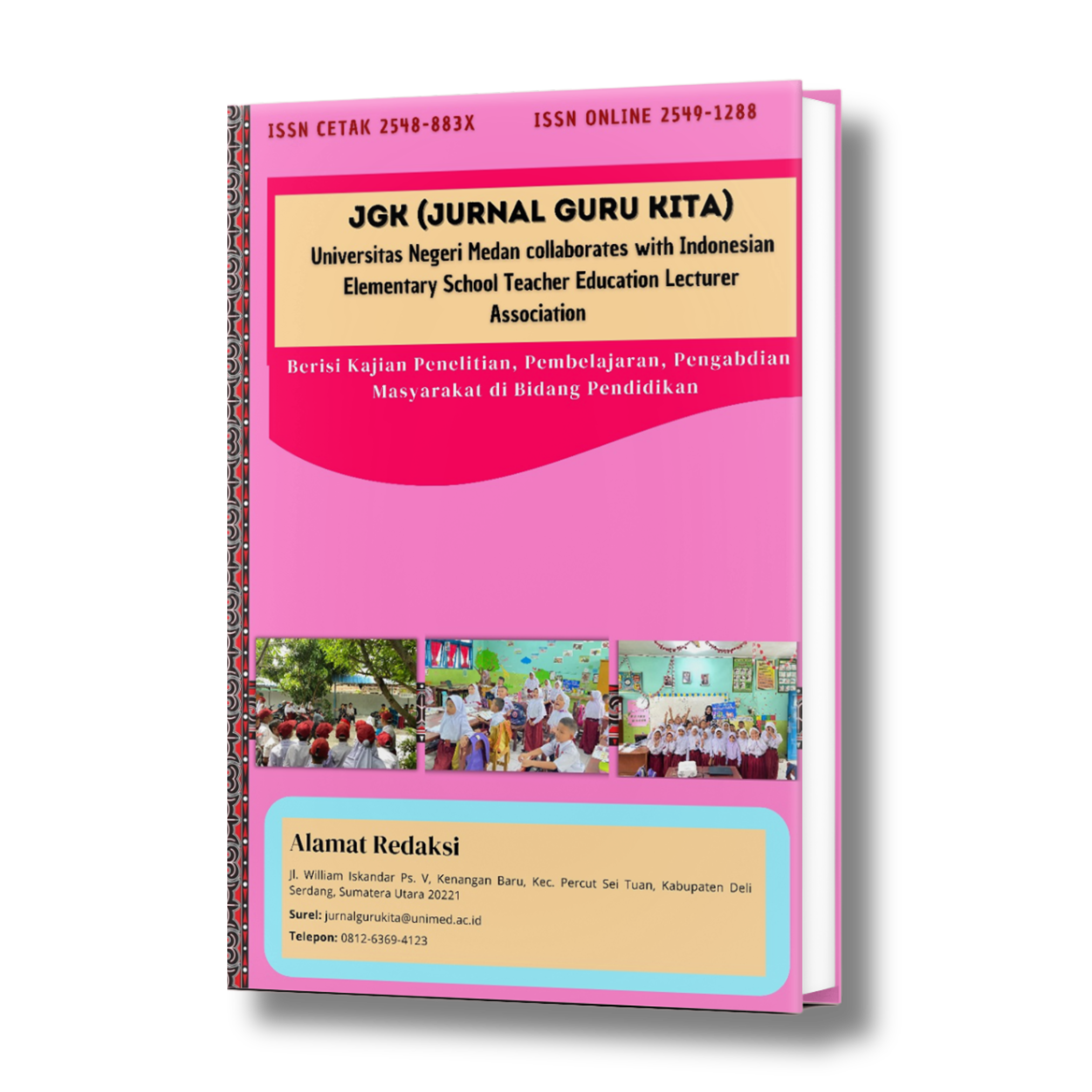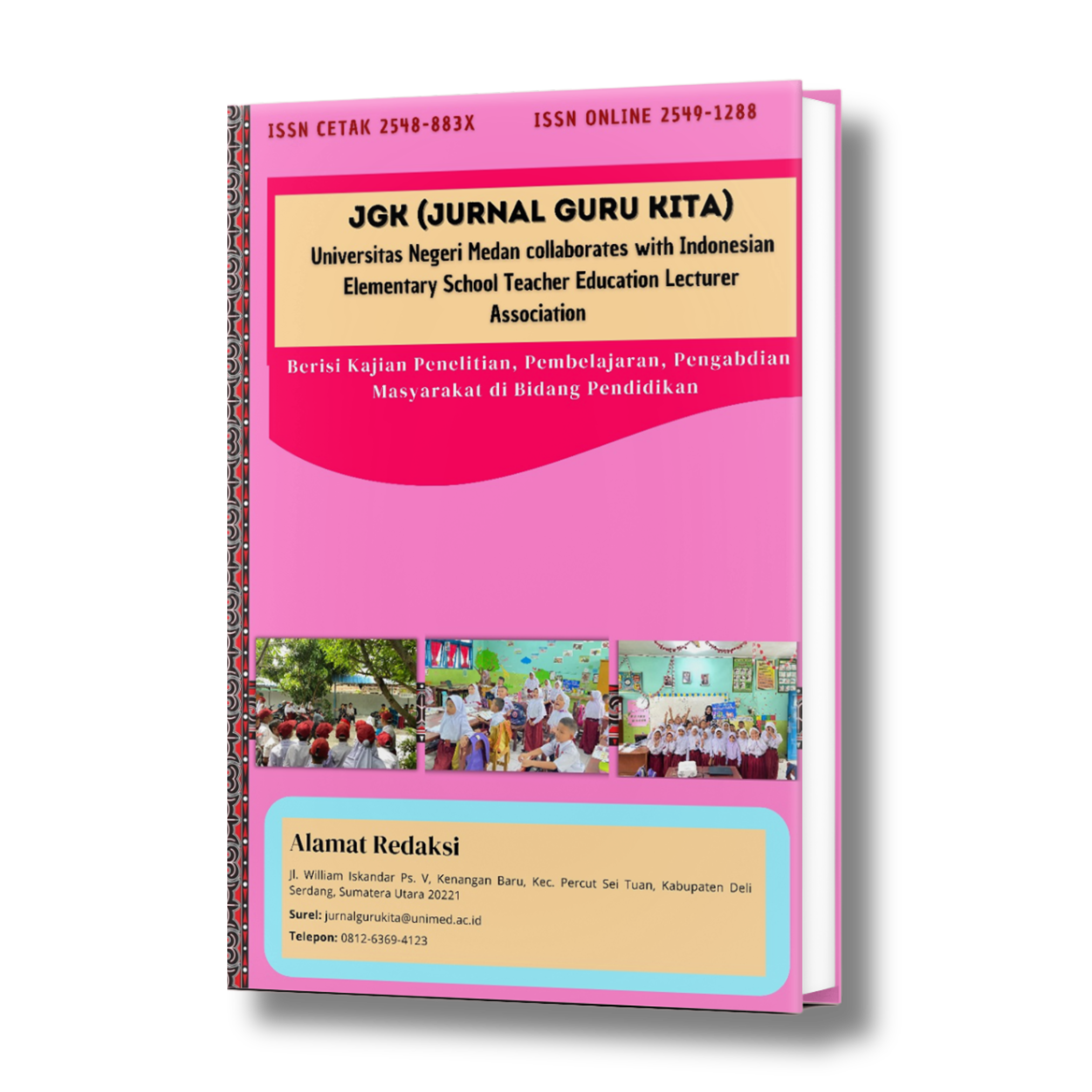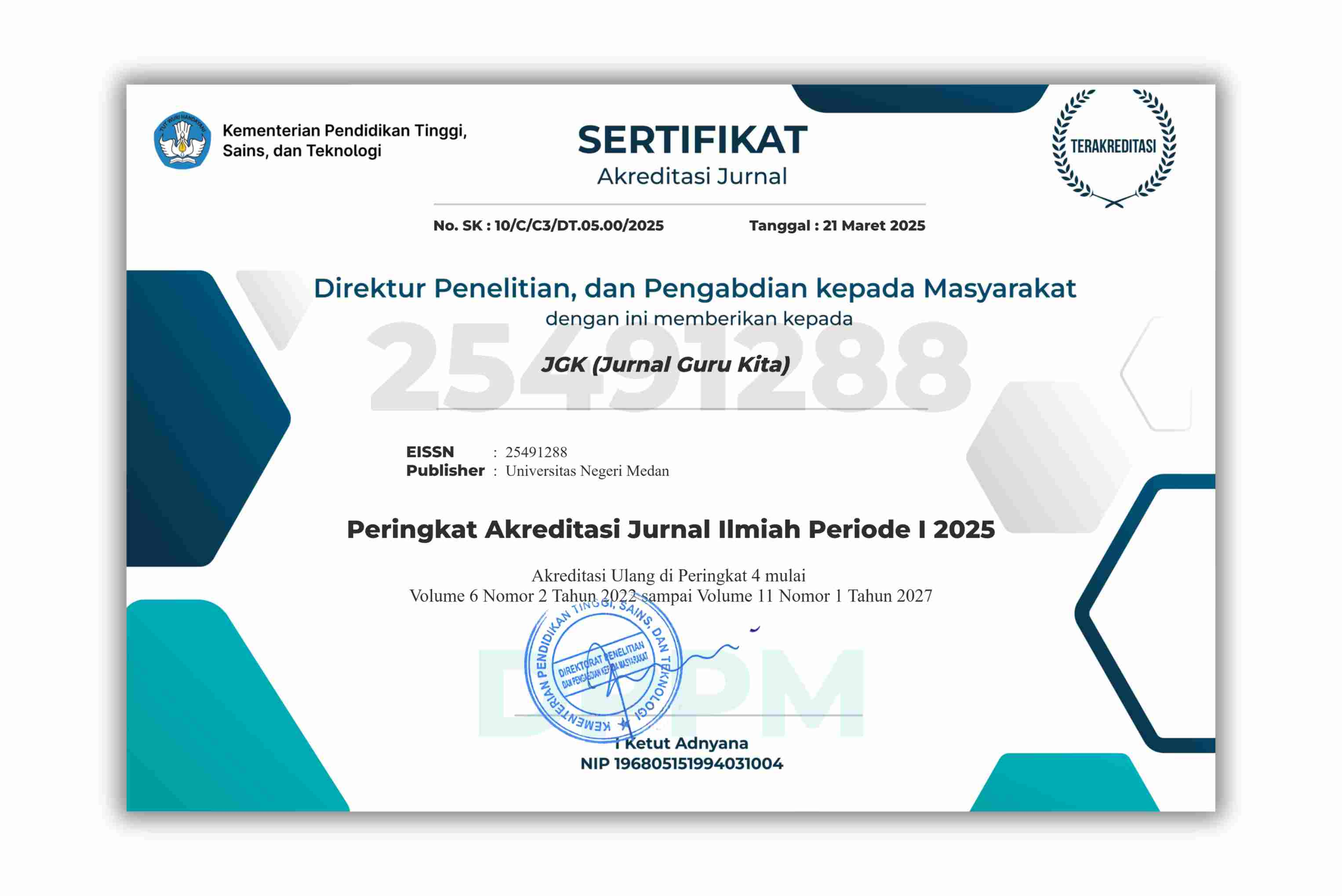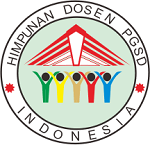Pengembangan Lembar Kerja Peserta Didik IPS Berbasis Wordwall
DOI:
https://doi.org/10.24114/jgk.v9i4.69513Keywords:
LKPD IPS, Wordwall, Sekolah DasarAbstract
Penelitian ini bertujuan untuk mengembangkan suatu LKPD IPS Berbasis Wordwall. Jenis penelitian ini yaitu Research and Development dengan menggunakan model ADDIE. Subjek penelitian ini adalah siswa-siswi kelas VB SDN 25 Lubuklinggau. Teknik pengumpulan data menggunakan observasi, wawancara, angket, tes dan dokumentasi. Berdasarkan hasil validasi LKPD IPS berbasis Wordwall penilaian ahli Bahasa, materi dan media menunjukkan bahwa LKPD IPS berbasisis Wordwall memenuhi kriteria valid dengan skor rata-rata 0,91. Sedangkan dari penilaian angket kepraktisan guru dan siswa bahwa pengembangna LKPD IPS berbasis Wordwall memenuhi kriteria praktis dengan skor rata-rata 86,5%. Pada uji lapangan diperoleh nilai N-gain 0,70 dengan klasifikasi tinggi sehingga pengembangan LKPD IPS berbasis Wordwall memiliki efektifitas tinggi. Berdasarkan hasil penelitian dapat disimpulkan bahwa Pengembangan Lembar Kerja Peserta Didik IPS Berbasis Wordwall terbukti valid, praktis dan efektif dalam pembelajaran siswa kelas V SDN 25 Lubuklinggau.References
Amir, J., Tamsiruddin, T., Saleh, M., Dalle, A., & Irmawati, I. (2025). Digital-Based Differentiated Teaching Materials (Barista) on The Material of Writing Procedure Texts. Educational Process International Journal, 16(1). https://doi.org/10.22521/edupij.2025.16.230
Bahri, A., Arifin, A. N., Jamaluddin, A. Bin, Muharni, A., & Hidayat, W. (2023). Smart Teaching Based on Lesson Study Promoting Stundent’s Digital Literacy in The Rural Area. European Journal of Educational Research, volume-12-(volume-12-issue-2-april-2023), 901–911. https://doi.org/10.12973/eu-jer.12.2.901
Bizami, N. A., Tasir, Z., & Kew, S. N. (2023). Innovative pedagogical principles and technological tools capabilities for immersive blended learning: a systematic literature review. Education and Information Technologies, 28(2), 1373–1425. https://doi.org/10.1007/s10639-022-11243-w
Damayanti, D. A., Utami, P. D., Sutanto, A. B., Ishartono, N., & Lestari, D. N. (2025). Gamifying Cooperative Learning: The Impact of Team Games Tournament and Wordwall Media on Student Engagement in Elementary Science Education. Jurnal VARIDIKA, 113–130. https://doi.org/10.23917/varidika.v37i2.8986
David, L., & Weinstein, N. (2024). Using technology to make learning fun: technology use is best made fun and challenging to optimize intrinsic motivation and engagement. European Journal of Psychology of Education, 39(2), 1441–1463. https://doi.org/10.1007/s10212-023-00734-0
Derakhshan, A., Kruk, M., Mehdizadeh, M., & Pawlak, M. (2021). Boredom in online classes in the Iranian EFL context: Sources and solutions. System, 101, 102556. https://doi.org/10.1016/j.system.2021.102556
Dewi, M., Berta Apriza, & Karsoni Berta Dinata. (2025). The Effectiveness of Wordwall Interactive Media in Teaching Mathematics in Elementary School: A Systematic Literature Review. MIMBAR PGSD Undiksha, 13(1), 127–137. https://doi.org/10.23887/jjpgsd.v13i1.92352
Edwin, M., Alwi, Z., & Izzah, I. (2025). Developing Interactive E-LKPD with Wizer.Me: A Needs Analysis for Enhancing Poetry Writing Skills in Junior High School Students in Palembang. AL-ISHLAH: Jurnal Pendidikan, 17(2), 1989–2005. https://doi.org/10.35445/alishlah.v17i2.6811
Fatmawati, B., Wazni, M. K., & Husnawati, N. (2021). The Study of Worksheets Based on Creative Problem Solving for Biology Subjects. Jurnal Penelitian Pendidikan IPA, 7(4), 701–706. https://doi.org/10.29303/jppipa.v7i4.831
Ghaisani, N. R. T., & Setyasto, N. (2023). Development of Liveworksheets-Based Electronic Student Worksheets (E-LKPD) to Improve Science Learning Outcomes. Jurnal Penelitian Pendidikan IPA, 9(8), 6147–6156. https://doi.org/10.29303/jppipa.v9i8.4571
Gideon, A., Lestari, N. T., Bano, V. O., Sari, M. N., Wicaksono, D., Adriana, N. P., Ibrahim, S., Anwar, K., Wardani, K. D. K. A., & Rizqi, M. (2023). Metode Penelitian Pendidikan. Pradina Pustaka.
Gimpel, H., Hall, K., Decker, S., Eymann, T., Gutheil, N., Lämmermann, L., Braig, N., Maedche, A., Röglinger, M., Ruiner, C., Schoch, M., Schoop, M., Urbach, N., & Vandirk, S. (2025). Using Generative AI in Higher Education: A Guide for Instructors. Journal of Information Systems Education, 36(3), 237–256. https://doi.org/10.62273/QLLG7172
Hamidah, A., Ayunasari, D. S., & Sanjaya, E. (2023). Development of E-LKPD in Motion System Materials for High School Class Using PageFlip 3D Software. Jurnal Penelitian Pendidikan IPA, 9(3), 1233–1241. https://doi.org/10.29303/jppipa.v9i3.3396
Juliana, N., Ampera, D., Farihah, Baharuddin, & Sinukaban, V. Y. (2024). Digital Student Worksheets to Improving Students’ Learning Independence. Journal of Education Technology, 8(1), 31–41. https://doi.org/10.23887/jet.v8i1.75433
Lin, X. (2024). Exploring the Role of ChatGPT as a Facilitator for Motivating Self-Directed Learning Among Adult Learners. Adult Learning, 35(3), 156–166. https://doi.org/10.1177/10451595231184928
Molina Roldán, S., Marauri, J., Aubert, A., & Flecha, R. (2021). How Inclusive Interactive Learning Environments Benefit Students Without Special Needs. Frontiers in Psychology, 12. https://doi.org/10.3389/fpsyg.2021.661427
Okojie, M. U., Bastas, M., & Miralay, F. (2022). Using Curriculum Mapping as a Tool to Match Student Learning Outcomes and Social Studies Curricula. Frontiers in Psychology, 13. https://doi.org/10.3389/fpsyg.2022.850264
Rahmayani, R. D., & Atmazaki, A. (2025). Development of Interactive E-LKPD Based on Live-Worksheets for Reading and Viewing Skills. AL-ISHLAH: Jurnal Pendidikan, 17(1), 73–89. https://doi.org/10.35445/alishlah.v17i1.6451
Ricky Ardiansah, & Zulfiani, Z. (2023). Development of interactive e-LKPD based on creative thinking skills on the concept of environmental change. JPBI (Jurnal Pendidikan Biologi Indonesia), 9(2), 179–197. https://doi.org/10.22219/jpbi.v9i2.22389
Rochmattulloh, A. S., Prastowo, S. B., & Farisi, M. I. (2022). Development of Hypermedia-Based Interactive Learning Tools to Improve Student Social Science Learning Outcomes. Jurnal Kependidikan: Jurnal Hasil Penelitian Dan Kajian Kepustakaan Di Bidang Pendidikan, Pengajaran Dan Pembelajaran, 8(4), 1074. https://doi.org/10.33394/jk.v8i4.5805
Safitri, R. R., & Jumadi, J. (2024). Game-Based Learning Media with Problem-Based Learning Model in Science: Effort to Enhance Critical Thinking Skills. 2024 6th International Workshop on Artificial Intelligence and Education (WAIE), 214–219. https://doi.org/10.1109/WAIE63876.2024.00046
Sartono, E. K. E., Sekarwangi, T., & Herwin, H. (2022). Interactive multimedia based on cultural diversity to improve the understanding of civic concepts and learning motivation. World Journal on Educational Technology: Current Issues, 14(2), 356–368. https://doi.org/10.18844/wjet.v14i2.6909
Sudrajat, A., Salsabila, F. G., & Marini, A. (2023). Digital-Based Flash Card to Increase Social Studies Learning Outcomes for Elementary School Students in The Fourth Grade. Journal of Education Technology, 7(2), 235–246. https://doi.org/10.23887/jet.v7i2.63327
Sugiyono, S. (2013). Metode penelitian pendidikan pendekatan kuantitatif, kualitatif, dan R&D. Alfabeta.
Sugiyono, S. (2016). Metode penelitian pendidikan : pendekatan kuantitatif, kualitatif, dan R&D. CV. Alfabeta.
Sugiyono, S. (2017). Metode penelitian kuantitatif, kualitatif dan R&D. CV. Alfabeta.
Sugiyono, S. (2019). Metode Penelitian Pendidikan (Kuantitatif, Kualitatif, Kombinasi, R&D dan Penelitian Pendidikan). CV. Alfabeta.
Sugiyono, S. (2022). Metode Penelitian Kuantitatif, Kualitatif Dan R&D. Alfabeta.
Suniasih, N. W., & Sujana, I. W. (2023). Interactive LKPD Based on Guided Discovery in Improving Science Learning Outcomes of Grade V Elementary School Students. Journal of Education Research and Evaluation, 7(1), 121–128. https://doi.org/10.23887/jere.v7i1.59627
Suryana, D., Sari, N. E., Winarti, Lina, Mayar, F., & Satria, S. (2021). English Learning Interactive Media for Early Childhood Through the Total Physical Response Method. JPUD - Jurnal Pendidikan Usia Dini, 15(1), 60–80. https://doi.org/10.21009/JPUD.151.04
Szymkowiak, A., Melović, B., Dabić, M., Jeganathan, K., & Kundi, G. S. (2021). Information technology and Gen Z: The role of teachers, the internet, and technology in the education of young people. Technology in Society, 65, 101565. https://doi.org/10.1016/j.techsoc.2021.101565
Tulaskar, R., & Turunen, M. (2022). What students want? Experiences, challenges, and engagement during Emergency Remote Learning amidst COVID-19 crisis. Education and Information Technologies, 27(1), 551–587. https://doi.org/10.1007/s10639-021-10747-1
Turnbull, D., Chugh, R., & Luck, J. (2021). Transitioning to E-Learning during the COVID-19 pandemic: How have Higher Education Institutions responded to the challenge? Education and Information Technologies, 26(5), 6401–6419. https://doi.org/10.1007/s10639-021-10633-w
Vodă, A. I., Cautisanu, C., Grădinaru, C., Tănăsescu, C., & de Moraes, G. H. S. M. (2022). Exploring Digital Literacy Skills in Social Sciences and Humanities Students. Sustainability, 14(5), 2483. https://doi.org/10.3390/su14052483
Xu, E., Wang, W., & Wang, Q. (2023). The effectiveness of collaborative problem solving in promoting students’ critical thinking: A meta-analysis based on empirical literature. Humanities and Social Sciences Communications, 10(1), 16. https://doi.org/10.1057/s41599-023-01508-1
Yu, B., & Zadorozhnyy, A. (2022). Developing students’ linguistic and digital literacy skills through the use of multimedia presentations. ReCALL, 34(1), 95–109. https://doi.org/10.1017/S0958344021000136
Downloads
Published
How to Cite
Issue
Section
License
Copyright (c) 2025 Anggun Anggraini, Andri Valen, Dea Wildaswari

This work is licensed under a Creative Commons Attribution-ShareAlike 4.0 International License.
Authors published with the JGK (Jurnal Guru Kita) agree to the following terms:
- Authors retain copyright and grant the journal the right of first publication with the work simultaneously licensed under a Creative Commons Attribution License (CC BY-SA 4.0) that allows others to share the work with an acknowledgment of the work's authorship and initial publication in this journal.
- Authors are able to enter into separate, additional contractual arrangements for the non-exclusive distribution of the journal's published version of the work (e.g., post it to an institutional repository or publish it in a book), with an acknowledgment of its initial publication in this journal.
- Authors are permitted and encouraged to post their work online (e.g., in institutional repositories or on their website) prior to and during the submission process, as it can lead to productive exchanges, as well as earlier and greater citation of published work. (See The Effect of Open Access)

























